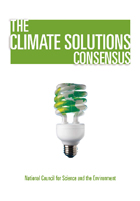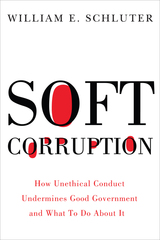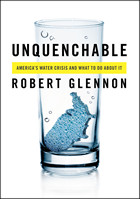3 books about Do About It

The Climate Solutions Consensus
What We Know and What To Do About It
National Council for Science and the Environment
Island Press, 2010
In 2007, the Intergovernmental Panel on Climate Change shared the 2007 Nobel Peace Prize (with former Vice President Al Gore) for its reporting on the human causes of climate change. In 2008, the National Council for Science and the Environment reported that the acceleration of climate change is already faster than the IPCC projected only a year earlier. How we deal with the rapid environmental changes, and the human forces that are driving these changes, will be among the defining issues of our generation.
Climate Solutions Consensus presents an agenda for America. It is the first major consensus statement by the nation’s leading scientists, and it provides specific recommendations for federal policies, for state and local governments, for businesses, and for colleges and universities that are preparing future generations who will be dealing with a radically changed climate. The book draws upon the recommendations developed by more than 1200 scientists, educators and decision makers who participated in the National Council for Science and the Environment’s 8th National Conference on Science, Policy and the Environment.
After presenting a lucid narrative of the science behind climate change and its solutions, Climate Solutions Consensus presents 35 practical, results-oriented approaches for minimizing climate change and its impacts. It clearly spells out options for technological, societal, and policy actions. And it deals head-on with controversial topics, including nuclear energy, ocean fertilization and atmospheric geo-engineering.
One of the book’s key conclusions is that climate solutions are about much more than energy sources. They involve re-examining everything people do with an eye toward minimizing climate impacts. This includes our eating habits, consumption patterns, transportation, building and housing, forestry, land use, education, and more. According to these scientists, the time to act is now. With clarity and urgency, they tell us exactly what needs to be done to start reversing the driving factors behind climate change, minimizing their consequences, and adapting to what is beyond our power to stop.
Climate Solutions Consensus presents an agenda for America. It is the first major consensus statement by the nation’s leading scientists, and it provides specific recommendations for federal policies, for state and local governments, for businesses, and for colleges and universities that are preparing future generations who will be dealing with a radically changed climate. The book draws upon the recommendations developed by more than 1200 scientists, educators and decision makers who participated in the National Council for Science and the Environment’s 8th National Conference on Science, Policy and the Environment.
After presenting a lucid narrative of the science behind climate change and its solutions, Climate Solutions Consensus presents 35 practical, results-oriented approaches for minimizing climate change and its impacts. It clearly spells out options for technological, societal, and policy actions. And it deals head-on with controversial topics, including nuclear energy, ocean fertilization and atmospheric geo-engineering.
One of the book’s key conclusions is that climate solutions are about much more than energy sources. They involve re-examining everything people do with an eye toward minimizing climate impacts. This includes our eating habits, consumption patterns, transportation, building and housing, forestry, land use, education, and more. According to these scientists, the time to act is now. With clarity and urgency, they tell us exactly what needs to be done to start reversing the driving factors behind climate change, minimizing their consequences, and adapting to what is beyond our power to stop.
[more]

Soft Corruption
How Unethical Conduct Undermines Good Government and What To Do About It
Schluter, William E
Rutgers University Press, 2017
New Jersey has long been a breeding ground for political corruption, and most of it is perfectly legal. Public officials accept favors from lobbyists, give paid positions to relatives, and rig the electoral process to favor their cronies in a system where campaign money is used to buy government results. Such unethical behavior is known as “soft corruption,” and former New Jersey legislator William E. Schluter has been fighting it for the past fifty years.
In this searing personal narrative, the former state senator recounts his fight to expose and reform these acts of government misconduct. Not afraid to cite specific cases of soft corruption in New Jersey politics, he paints a vivid portrait of public servants who care more about political power and personal gain than the public good. By recounting events that he witnessed firsthand in the Garden State, he provides dramatic illustrations of ills that afflict American politics nationwide.
As he identifies five main forms of soft corruption, Schluter diagnoses the state government’s ethical malaise, and offers concrete policy suggestions for how it might be cured. Not simply a dive through the muck of New Jersey politics, Soft Corruption is an important first step to reforming our nation’s political system, a book that will inspire readers to demand that our elected officials can and must do better.
Visit: www.softcorruption.com (http://www.softcorruption.com)
In this searing personal narrative, the former state senator recounts his fight to expose and reform these acts of government misconduct. Not afraid to cite specific cases of soft corruption in New Jersey politics, he paints a vivid portrait of public servants who care more about political power and personal gain than the public good. By recounting events that he witnessed firsthand in the Garden State, he provides dramatic illustrations of ills that afflict American politics nationwide.
As he identifies five main forms of soft corruption, Schluter diagnoses the state government’s ethical malaise, and offers concrete policy suggestions for how it might be cured. Not simply a dive through the muck of New Jersey politics, Soft Corruption is an important first step to reforming our nation’s political system, a book that will inspire readers to demand that our elected officials can and must do better.
Visit: www.softcorruption.com (http://www.softcorruption.com)
[more]

Unquenchable
America's Water Crisis and What To Do About It
Robert Glennon
Island Press, 2010
In the middle of the Mojave Desert, Las Vegas casinos use billions of gallons of water for fountains, pirate lagoons, wave machines, and indoor canals. Meanwhile, the town of Orme, Tennessee, must truck in water from Alabama because it has literally run out.
Robert Glennon captures the irony—and tragedy—of America’s water crisis in a book that is both frightening and wickedly comical. From manufactured snow for tourists in Atlanta to trillions of gallons of water flushed down the toilet each year, Unquenchable reveals the heady extravagances and everyday inefficiencies that are sucking the nation dry.
The looming catastrophe remains hidden as government diverts supplies from one area to another to keep water flowing from the tap. But sooner rather than later, the shell game has to end. And when it does, shortages will threaten not only the environment, but every aspect of American life: we face shuttered power plants and jobless workers, decimated fi sheries and contaminated drinking water.
We can’t engineer our way out of the problem, either with traditional fixes or zany schemes to tow icebergs from Alaska. In fact, new demands for water, particularly the enormous supply needed for ethanol and energy production, will only worsen the crisis. America must make hard choices—and Glennon’s answers are fittingly provocative. He proposes market-based solutions that value water as both a commodity and a fundamental human right.
One truth runs throughout Unquenchable: only when we recognize water’s worth will we begin to conserve it.
Robert Glennon captures the irony—and tragedy—of America’s water crisis in a book that is both frightening and wickedly comical. From manufactured snow for tourists in Atlanta to trillions of gallons of water flushed down the toilet each year, Unquenchable reveals the heady extravagances and everyday inefficiencies that are sucking the nation dry.
The looming catastrophe remains hidden as government diverts supplies from one area to another to keep water flowing from the tap. But sooner rather than later, the shell game has to end. And when it does, shortages will threaten not only the environment, but every aspect of American life: we face shuttered power plants and jobless workers, decimated fi sheries and contaminated drinking water.
We can’t engineer our way out of the problem, either with traditional fixes or zany schemes to tow icebergs from Alaska. In fact, new demands for water, particularly the enormous supply needed for ethanol and energy production, will only worsen the crisis. America must make hard choices—and Glennon’s answers are fittingly provocative. He proposes market-based solutions that value water as both a commodity and a fundamental human right.
One truth runs throughout Unquenchable: only when we recognize water’s worth will we begin to conserve it.
[more]
READERS
Browse our collection.
PUBLISHERS
See BiblioVault's publisher services.
STUDENT SERVICES
Files for college accessibility offices.
UChicago Accessibility Resources
home | accessibility | search | about | contact us
BiblioVault ® 2001 - 2024
The University of Chicago Press









